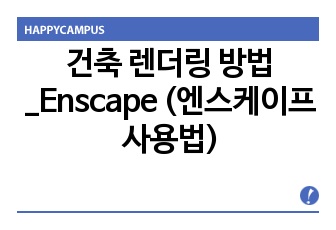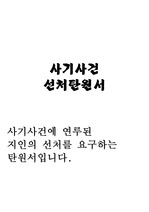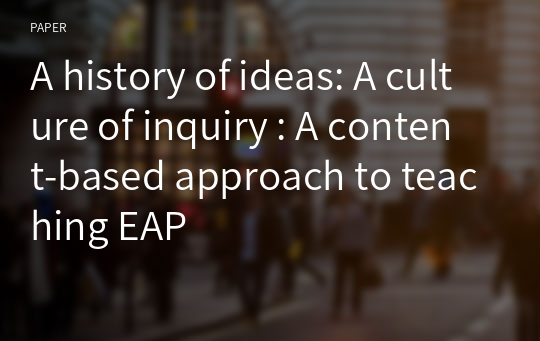A history of ideas: A culture of inquiry : A content-based approach to teaching EAP
(주)코리아스칼라
- 최초 등록일
- 2016.04.02
- 최종 저작일
- 2008.12
- 18페이지/
 어도비 PDF
어도비 PDF
- 가격 5,200원

* 본 문서는 배포용으로 복사 및 편집이 불가합니다.
서지정보
ㆍ발행기관 : 서울대학교 외국어교육연구소
ㆍ수록지정보 : 외국어교육연구 / 11권
ㆍ저자명 : Dr. Matthew Piscioneri
목차
Abstract
Ⅰ. Introduction
Ⅱ. Presentation and delivery format
Ⅲ. Rationale
Ⅳ. Discussion
Ⅴ. The Contemporary discourse of EAP
Ⅵ. Conclusion
References
영어 초록
The paper outlines a model for an English for Academic Purposes [EAP] programme designed to enhance the micro and macro study skills of students in the Arts from non-Western educational backgrounds. This EAP model draws on Jurgen Habermas‟s (1995; 1988) theory of communicative rationality to argue that the contemporary culture of inquiry in Arts‟ subjects reflects the communicative rationality that – according to Habermas -- has constituted the modern, Occidental lifeworld. The emergence of communicative rationality Habermas suggests is socio-culturally and historically specific. In other words, it has largely been absent from the socio-cultural contexts of many non-local entrants into Western universities. Yet, effective and successful participation in the Western academic discourse community, as well as everyday or non-scientific discourse communities, at least partly depends on a non-local student‟s awareness of the historical impacts generated by the developmental trajectory of communicative rationality. Successful participation in the Western academic context also depends on a non-local student‟s growing mastery over the methodologies, again generated by communicative rationality, that underpin this culture of inquiry. The EAP model proposes a practice based on a history of the ideas that form the bases of the Western academic tradition. It suggests that the macro (critical thinking, formal register) and micro-level (word choice, sentence construction) skills expected of students in Arts‟ subjects in Western universities are shaped by broader disciplinary and historical features. The pedagogical framing of this EAP model reflects the principles of situated learning theory (Lave & Wenger, 1990; McLellan, 1995) and addresses the recent research of Duff (2007), Morita (2004) and Zamel and Spack (1998).
참고 자료
없음
"외국어교육연구"의 다른 논문
더보기 (2/7)




























